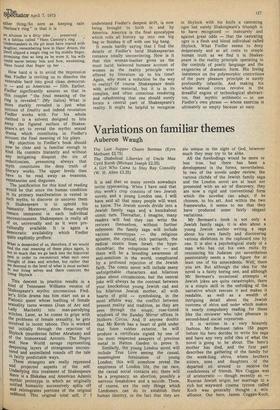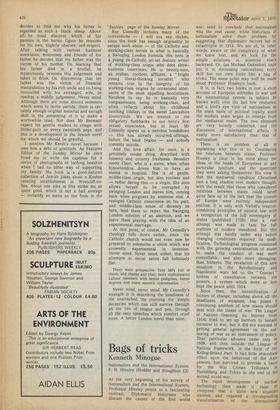Variations on familiar themes
Auberon Waugh
The Last Supper Chaim Berman (Eyre Methuen a75) The Diabolical Liberties of Uncle Max Cyril Kersh (Michael Joseph £2.25) A Girl Who Came to Stay Ray s Connolly (W. H. Allen E2.25) It is sad that so many novels nowadays invite typecasting. When I have said that this week's crop consists of two Jewish novels and a young London one, I will have said all that many people will want to know. The Jewish novels divide into a Jewish family saga and a knockabout comic turn. Thereafter, I imagine, many readers will feel they can write the reviews themselves, without further reference: the family saga will include various stereotypes — the religious spinster, the cynical, rich patriarch; the radical cousin from Israel; the hypochondriac; the voluptuous wife — and there will be a brooding awareness of anti-semitism in the world, complicated by a profound rejection of the Jewish faith. The comic novel will include many unforgettable characters and hilarious jokes about circumcision, but the central joke will always be the contrast between your knockabout young Jewish cad and his hilarious Jewish mother, all with hearts of gold — symbolising, in the most affable way, the conflict between present reality and tradition, as they are seen through the soupy, rose-tinted windows of the Sunday Mirror offices in Holborn Circus. And if anyone doubts that Mr Kersh has a heart of gold under that foam rubber exterior, he will produce a certificate signed by one of the most respected assayers of precious metal in Hatton Garden to prove it.
Similarly, the young London novel will include True Love among the casual, meaningless fornication of young I,ondon; this will somehow reveal the emptiness of London life, the rat race, the casual social contacts etc; there will be a pregnancy, an abortion, possibly a nervous breakdown and a suicide. These, of course, are the only things which Londoners can do to establish their human identity, or the fact that they are ale unique in the sight of God, however much they may try to be alike.
All the forebodings would be more or less true, but there has been a development in the forms, nevertheless. In two of the novels under review, the various clichés of the Jewish family saga. and the London novel are at least not presented with an air of discovery, they are now a rigid and conventional form which the novelist can adapt, if he chooses, to his art. And within the two frameworks, it seems to me that they have produced some fairly elegant variations.
Mr Bermant's book is not only a Jewish family saga, it is also about a young Jewish author writing a saga about his own family and discovering various skeletons in the cupboard one by one. It is also a psychological study of a man who has cut his own roots by renouncing his Judaism yet nevertheless passionately needs a hero figure for at least one of his antecedents. Well, there you are. But although the idea for the novel is a fairly boring one, and although Mr Bermant's occasional attempts at Jewish jokes are quite catastrophic, there is a simple skill in the unfolding of the narrative which rescues it and makes it readable, as well as a wealth of intriguing detail about the Jewish customs of shiva and seder which makes it nearly compulsory reading for those like the reviewer who take pleasure in second-hand social voyeurism.
It is written in a very leisurely fashion. Mr Bermant takes 153 pages before his hero decides to write his saga and have any very solid idea of what the novel is going to be about. The hero's mother has died, and the first part describes the gathering of the family for the week-long shiva, where brothers sisters, sons and daughters of the departed sit around to receive the condolences of friends. Mrs Coggan was of aristocratic — though recently so — Russian Jewish origin; her marriage to a rich but wayward cinema tycoon called Koch was generally thought a misalliance. Our hero, James Coggan-Koch, decides to find out why his father is regarded as such a black sheep. Above all, he must discover which of his parents is the heroic figure he requires for his own, slightly obscure, self-respect.
After talking with various business associates, mistresses and friends of his father he decides that his father was the victim of his mother. On learning that his father died in a brothel, he mysteriously reverses this judgement and takes to drink. On discovering that his father was the victim of financial manipulation by his rich uncle and on being reconciled with his estranged wife, he reaches a middle judgement. Never mind. Although there are some absurd moments which seem to invite parody, there is certainly enough original material and enough skill in the presenting of it to make a worthwhile read. Nor does Mr Bermant expect his gentile readers to cringe with Hitler-guilt on every twentieth page, and this is a development in the Jewish novel for which we should be grateful.
I mention Mr Kersh's novel because I owe him a debt of gratitude. As Features Editor of the Sunday Mirror he once hired me to write the captions for a series of photographs of bathing beauties when I had no other way of supporting my family. His book is a good-natured collection of Jewish jokes about a Kosher catering establishment in Westcliff-onSea. About one joke in five strike me as quite good, which is not a bad average — certainly as many as one finds in the ' funnies' page of the Sunday Mirror.
Ray Connolly includes many of the conventions — I will not say . cliches, since the book has enough originality to escape such abuse — of the Catholic and working-class novels in what is basically a Swinging London formula. His hero is a young ex-Catholic jet-set feature writer of working-class origin who does show business interviews. He is twenty-nine, an orphan, rootless, affluent, a "bright young liberal-thinking socialist" who remains true to the integrity of his working-class origins by occasional utterances of the most appalling boorishness. Needless to say he is basically very compassionate, being working-class, and often reflects about his childhood catching tiddlers in the sweet Lancashire countryside. We are treated to the obligatory flashbacks to our heio's first sexual experience, but at leapt Mr Connolly spares us a nervous breakdown — this has already occurred, offstage, before the book begins — and nobody commits suicide.
And the love affair, for once, is a genuinely tender thing, described with honesty and country freshness. Benedict meets Clare, who is a nurse, when urban hypochondria drives him to have an enema in hospital. She is of gentle, middle-class origin, but also rootless and — rather daring this — a virgin. She soon allows herself to be corrupted by swinging London and leaves him, coming back when pregnant by someone else. A vestigial Catholic conscience on his part, and middle-class sense of decency on hers, lead them to reject the Swinging London solution of an abortion, and we leave them playing with the idea of an experimental marriage.
At this point, of course, Mr Connolly's theology falls down rather, since the Catholic church would not even now be prepared, to solemnise a union which was avowedly experimental in intention. Never mind. Never mind, either, that his attempts at social satire fall hideously flat: There were prospective Tory MPs full of cheek, and cheeks and Chat; more sophisticated Labour members with better pedigrees, better degrees and more esoteric conversation . . ."
Never mind, never mind. Mr Connolly's strength is in describing the loneliness of the unattached, the yearning for simple decencies which can still survive through all the lies of tongue and pen, through all the easy speeches which comfort cruel ment. A better London novel than most.



































 Previous page
Previous page